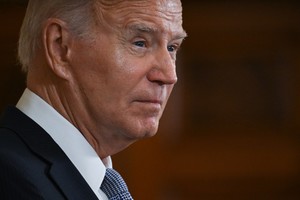2024 Voter Guide: Where the Presidential Candidates Stand on Healthcare

During the COVID-19 pandemic, healthcare systems faced an unprecedented surge of hospitalizations. Both the toll and stress of the pandemic have contributed to the erosion of public confidence in American healthcare. More than a third of Americans believe that their healthcare system is below average worldwide while around half of U.S. adults state that they have trouble affording high medical costs.
In terms of policy, 53% of Americans say it is the responsibility of the federal government to make sure all Americans have healthcare coverage, though this has declined from 60% in September 2018.
Republicans and Democrats are sharply divided on this though — 81% of Democrats believe it is the responsibility of the federal government, while 77% of Republicans believe the federal government does not have this responsibility. Americans are also divided over how health insurance should be provided. 27% of Americans support a single national program, whereas 24% believe it should be provided through a mix of private and public programs. Those who say the government is not responsible for healthcare mostly want to keep Medicare and Medicaid, with only 6% wanting no government involvement at all.
Subissues:
Joe Biden (D): Supports the Affordable Care Act.
As president, he strengthened the Affordable Care Act by increasing marketplace subsidies for health insurance. He also approves an individual mandate for Americans to obtain healthcare, meaning most people who do not sign up for health insurance would face a financial penalty.
Donald Trump (R): Opposes the Affordable Care Act.
Though he once supported a repeal of the Affordable Care Act, during his presidency, he shifted to rebranding or revamping it. He signed a 2017 GOP-backed tax law that removed the individual mandate, but kept most of the bill intact. He also signed an executive order to cover Americans with pre-existing conditions and expanded health reimbursement arrangements, setting aside money for people to spend on health insurance. He has recently stated that he will look for “alternatives” to the Affordable Care Act, reviving his past promise to repeal it.
Cornel West (Ind.): Not enough information.
RFK Jr. (Ind.): Not enough information.
Joe Biden (D): Against Medicare for All, but supports the expansion of Medicare.
He signed the Inflation Reduction Act into law which gave Medicare the ability to negotiate lower prescription drug prices for ten drugs. He introduced a Medicare-like public option for individuals and families, expanding healthcare coverage. He also lowered the Medicare eligibility age to 60 years old. However, he is against “Medicare for All” and has suggested that he would veto it, instead advocating to strengthen existing healthcare systems.
Donald Trump (R): Against Medicare for All, but supports the expansion of Medicare.
He wants to improve Medicare by uprooting fraud, waste, and abuse. He has warned his party that “under no circumstances should Republicans vote to cut a single penny from Medicare or Social Security.” However, he is against Medicare for All. During his presidency, he moved to privatize parts of Medicare, allowing private companies to participate in Medicare in what is known as a direct contracting model.
Cornel West (Ind.): Supports going beyond Medicare for All.
He hopes to “go beyond Medicare for All,” but his alternative remains unclear.
RFK Jr. (Ind.): Not enough information.
Joe Biden (D):
He has advocated to cut the cost of prescription drugs, specifically insulin, hoping to cap the cost at $35 per month. He has also focused on eliminating hidden junk fees in prescription drug costs: “If finalized, the rule would limit so-called “short-term” plans to… establish a clear disclosure for consumers of the limits of these plans.”
Donald Trump (R):
He signed an executive order requiring healthcare price transparency on prescription drugs. He also cut down FDA restraints on drug developments to increase generic drugs in the market.
Cornel West (Ind.):
He hopes to nationalize the pharmaceutical industry to control prescription drug prices.
RFK Jr. (Ind.): Not enough information.
Joe Biden (D): Supports gender-affirming care for minors.
He is against the discrimination of transgender individuals in healthcare and reversed a Trump-era policy that limited “sex” discrimination protections at federally-funded healthcare providers solely to biological sex. He signed an executive order increasing access to gender-affirming care for minors.
Donald Trump (R): Against gender-affirming care for minors.
He is against “the promotion” of gender transitioning for people of all ages.
Cornel West (Ind.): Supports gender-affirming care for minors.
He hopes to remove transgender discrimination from healthcare policies and establish a Health Bill of Rights for disabled people.
RFK Jr. (Ind.): Not enough information.
This blog was written by Harry Ding, content intern (Center bias). It was reviewed and edited by Henry A. Brechter (Center bias), Malayna Bizier (Right bias), Johnathon Held (Lean Right bias), and Joseph Ratliff (Lean Left bias).

May 9th, 2024

May 7th, 2024

May 7th, 2024